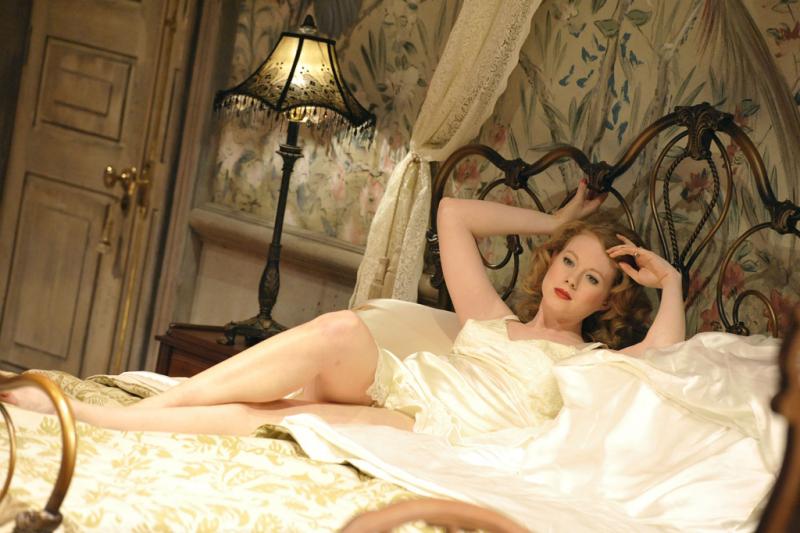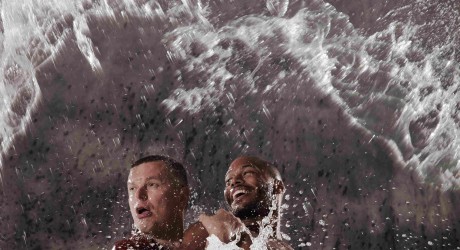We named it after a film, and there are only ever four of us doing it. The same four. It just feels better that way. We trust each other, because we know more or less how we act when we’re doing it. It’d just be weird if there were anyone else involved. I’m not sure what the others think. Okay, let’s say it were to happen. It would take at least a few times for us all to become familiar with that person being in the room, going through the same process as the rest of us, before it would be genuinely worthwhile for the group. Because it feels pretty powerful, the O.
It’s a very special moment. An important moment. Vaguely religious, we’ve said. I really don’t understand folk who take it at parties, or with people they barely know outside nightclubs. I just don’t get that. They don’t understand O is far better under controlled conditions. Perhaps that’s putting it a little strongly, but, well, how best to put it…
You know how even the best paintings must stay within the confines of a canvas? Or a frame?
Andre gets things started. He invites me over for the evening, usually midweek, and I’m at his door in 15 minutes. After climbing four floors, I collapse on his sofa and throw him a couple of beer bottles to open with his lighter. I still can’t do that. Some people make it look so easy. Apparently the trick is leverage, not force.
Andre’s room’s getting pretty dark by this point. There’s a lamp at the end of his bed – one that he’s had for years, and refuses to replace. He has a tall bookcase that stands in the corner, then there’s his recording equipment, like, everywhere. We’ll share those couple of beers and a cigarette while I talk about my studies, and he plays me some of his recent tunes on his laptop. He’ll never let anyone hear a track that’s unfinished, though.
Jennifer might be there, too – in his bed, or at least en route – while this is happening. Jordi’s usually knocking around in his bedroom, or cooking, or something. I don’t know Jordi as well as Andre.
Sooner or later, all four of us are together, sitting in various positions of comfort on Andre’s furniture. We take a few lines of O, then just sit back and enjoy the trip. Jennifer starts hallucinating pretty much instantly, while the rest of us try to hold conversation as we were. When we begin trailing off mid-sentence, we know we’re almost there. Then my heart starts racing and I begin on this wacky train of thought. Like about how being involved in artistic expression informs how you might choose to handle events in your own life. Like about how life can imitate art’s example of dealing with tragedies in your family, unconsciously. Like about how, in the film I was watching earlier, the score perfectly complemented the tempo of that guy’s voice. Like about how everything’s in some sort of rhythm because everything’s constantly making reactionary movements.
There’s a huge lampshade in Andre’s room. One of those flimsy, baggy, nicotine-yellowed ones ribbed with metal wiring. You’d know what I meant to see one. I had one in the room I shared with my sister, back when we lived with our uncle.
Well, that thing gets interesting. It becomes a focal point for us all. We’re all on our own journeys towards the Zenith, but the lampshade sort of pulls us towards one another. Like the moon. It’s incredible. It’s really, kind of, involving.
So we’re all hanging in the lampshade’s quasi-lunar pull, and we’re very conscious of it. Jordi’s pulling some really strange faces and looks like he’s having a nightmare, while Andre plays the music of some early 20th-century Polish cellist or other and lights some candles. When I arrive at the Zenith, I start seeing things in shapes. Like, a rectangle. A rectangle that’s thick at the top and thin at the bottom. A trapezium, I suppose, packed with particles – small, miniscule dots, each one fending for itself. Despite being gradually inter-connected, there’s a hierarchy among them. Just as in human society. These particles are organisms, creatures, and inside them are all the little aspects that comprise their existence – basically anything that has the capacity to be strong or weak at some level. In human society, we have sport. We have athletes and tennis players. We also have bacteria and diseases. These things are acting selfishly. There are strategies involved in them fighting, desperately, to survive, to become the best. Battling, growing, shrinking. They interact with others for their own gain; to boost their own contentment and morale, which they require to optimise their own performances and therefore rise within the trapezium’s order. Some of the particles learn techniques of achieving this success, while, for others, such knowledge is innate. And these techniques have their doubters and advocates, which live and die like the particles themselves.
You know, perhaps human beings are the most emotionally sensitive organisms in the universe. Above us, in a larger trapezium, to use a relevant metaphor, may exist far more numb, robotic nuances of life.
I catch Jennifer’s eye across the other side of the room. The light’s on. She sits on Andre’s bed, gently rocking her back and tugging the bedsheet beneath her. Her eyes roll backwards before fixing on a stare in my direction. It’s not particularly alluring or erotic – it’s just a locking of eyes, against a wall of colour. In that moment, it’s like we’re mentally fused. Then we begin laughing about something both of us have already forgotten.
After a thing happened involving Jennifer and I taking photos of ourselves, I find myself in the kitchen. I’m looking at one of Jordi’s knives, the point of which is dug into a wooden chopping board on the side. I’m not sure if it’s wobbling slightly. It could actually be very still.
A half-helped-from stir fry stews away in a rusty wok; a stray noodle dangles over the side. The sink is a long way from where I’m stood, or probably leaning. I can just about make out the dishes, which are sprinkled with slowly crusting matter, the bent and/or chipped crockery emerging onto the draining board to the left, and the handles of pans that must have, at some point, been carelessly thrust into this miserable equation where everything’s either wet or cold. But that isn’t really of note. What’s of note is what looks like a pool of blood on the floor beside the washing machine. There’s red trickling from inside the circular door, running along the grooves of the plastic flooring, settling in a watery well about four feet away from where I’m stood. Or leaning.
I want to go over and check it out, but the O is making me feel like I’m wearing boots that weigh thirty times what they do. My fingers have pins and needles, but my focus is sharp. Everything I see is given an angled embellishment, and I find myself staring at objects unexpectedly. For how long, I’m not sure.
The dial on the machine is lit up, and the timer is blinking 16:32, which is impossible. I come to the conclusion that it’s better I go back in the room with Andre, Jordi and Jennifer, in Andre’s room, where I find out pretty quickly that what I thought was blood isn’t blood – it’s juice. Juice. They’re laughing at me, and I recall seeing the knife, its blade sitting deep in the chopping board, and wonder why it ever seemed so menacing in the first place. After that I, for just a few moments, begin thinking as if I’m in a psychiatric ward. I begin examining my most significant flaws as a person, which include
1) Worrying about what others think of me.
a. Am I an embarrassment?
b. Am I a let-down?
And also
2) Why do I always want people to be pleased with me?
(One day, I should probably tell you about my uncle.)
So, having laughed at me for thinking it was blood trickling from the washing machine, Andre, Jordi and Jennifer’re all now just laid there, dreaming, silent. The moon shines in through the window. Cars pull up at red lights on the road outside. Even with Andre’s place this much higher than the street, I can hear them. Street sweepers, too. Jennifer exhales and waves her hands in the air. Some time before, when we’d locked eyes, maybe, her hand-waving would have appeared beautifully rhythmic, superbly synchronised with the ticking or buzzing of something else. But not now. Now it’s the dead of night. Now it’s clearly time to go.
My wired mind drags my sleeping skin off the sofa, and each considered stride towards the door feels like a Herculean effort, as the O clings on defiantly. When I eventually make it out, my boots mark frost on the street as an icy wind stings my throat like a cigarette before work. I pass through the city’s dying sodium nightlife and ask myself: was that fun?
A few nights later, when I get bored again, I decide that it was.
———
Click here for more Prose
Click here to follow clarkspeak on Twitter
Click here to follow clarkspeak on Facebook


